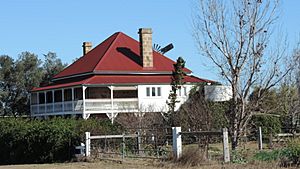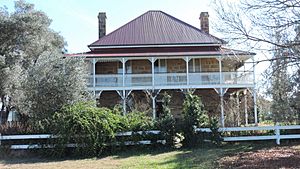Burndale, Swan Creek facts for kids
Quick facts for kids Burndale, Swan Creek |
|
|---|---|

Burndale, 2015
|
|
| Location | Cutmore's Road, Swan Creek, Southern Downs Region, Queensland, Australia |
| Design period | 1870s - 1890s (late 19th century) |
| Built | c. 1876 |
| Built for | Timothy Murphy and Peter McGuckin |
| Official name: Burndale, Warrenilla | |
| Type | state heritage (landscape, built) |
| Designated | 21 October 1992 |
| Reference no. | 600524 |
| Significant period | 1870s (fabric) 1860s-1870s (historical) |
| Significant components | tank - water, residential accommodation - main house, tank stand, trees/plantings |
| Lua error in Module:Location_map at line 420: attempt to index field 'wikibase' (a nil value). | |
Burndale is a very old house located on Cutmore's Road in Swan Creek, Australia. It was built around 1876. This historic home is also known as Warrenilla. It was added to the Queensland Heritage Register on October 21, 1992, because of its special history and features.
The Story of Burndale
Burndale was built near Warwick around 1865. It was made for Timothy Murphy and Peter McGuckin. They were some of the first European settlers in the Swan Creek area.
Early Days in Swan Creek
The Swan Creek area is about 11 kilometers (7 miles) from Warwick. It was known as the Agricultural Reserve. This meant it was a very fertile area for farming. Early settlers in the 1860s wanted to buy land here for farming. The land where Burndale stands was originally 38 acres. It was chosen under a special law from 1863 to help people get land for farming.
From Hotel Idea to Family Home
Burndale was first built with the idea of becoming a hotel. However, this never happened. Instead, Burndale has always been a private home. The house was built using sandstone from local quarries. John Deveney from Yangan helped transport the stone.
McGuckin's Racecourse
Peter McGuckin bought the entire property in 1877. He loved horse racing. He even built a racecourse right next to his home! On race days, the balcony of Burndale was used as a grandstand. Spectators could watch the races from there.
New Owners: The Cutmore Family
When McGuckin passed away in 1883, the property went to Samuel Cutmore. The Cutmore family was another important early family in the area. The house stayed with the Cutmore family until 1974.
Changing Hands and Names
In 1974, Ian and Sarah McMaster bought the property. They changed its name to Warrenilla. Then, in 1976, the current owners bought the house. They changed its name back to Burndale.
What Burndale Looks Like
Burndale is a two-storey house made of sandstone. It has wooden verandahs (porches) and a roof made of corrugated iron. The house stands out in the gently rolling landscape. It has a simple square shape. Verandahs wrap around all sides of the house. They are shaded by a curved corrugated iron roof. A pyramid roof sits above the verandahs. There are large brick chimneys on the north and south sides.
Some parts of the verandahs have been closed in with weatherboard. This includes parts of the northern side, all of the western side, and most of the southern side.
Verandah Details
The verandahs are held up by square posts with angled edges. They have decorative brackets and wooden screens. The open parts of the verandah have cast iron railings and decorations. Grape vines grow around the bottom of the house, climbing on wires between the verandah posts.
Windows and Walls
On the upper floor, there are glass French doors that open onto the verandah. On the lower floor, there are wooden sliding windows and wooden doors. The sandstone walls are made of neatly cut stones. They have been recently repaired. In the north-west corner of the house, there is a wash house. It is built into the base of a water tank that stands on tall wooden stumps.
The Garden
The garden around Burndale has many old trees. These include olive trees, fruit trees, cypress pines, and a she-oak.
Burndale is a special example of a two-storey sandstone house. Its outside look is still original and in good condition.
Why Burndale is Important
Burndale is listed on the Queensland Heritage Register because it meets several important rules.
Showing Queensland's History
Burndale helps us understand how Queensland's history unfolded. It shows how farming areas were settled in the Darling Downs region.
A Rare Example
It is an unusual example of a two-storey sandstone house from the 1860s in a rural area. This makes it a rare part of Queensland's heritage.
A Typical Sandstone House
Burndale also shows the main features of a sandstone house from the Warwick area.
Beautiful to Look At
Many people in the community value Burndale for its beauty. It adds a special look to the Swan Creek landscape.
Connected to Important Families
Burndale has a special connection to the McGuckin and Cutmore families. Both were important early European settlers in the Swan Creek area.


